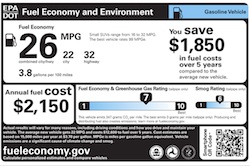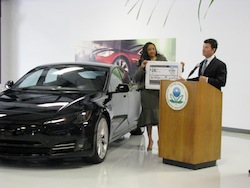Amidst high gas prices consumers, legislators and NGO’s (non government organization) have all called for stricter fuel economy standards. Yesterday the U.S. Environmental Protection Agency and the U.S. Department of Transportation unveiled new fuel economy labels designed to help consumers take advantage of increased efficiency standards enacted under the Obama Administration. The increased fuel economy standards are designed to help save consumers money at the pump.
 Changes to the new labels are the most dramatic in over 30 years, and provide more comprehensive fuel efficiency information, including estimated annual fuel costs, savings, as well as information on each vehicle’s environmental impact. The announcement was made today at electric car maker Tesla‘s headquarters in Palo Alto, California.
Changes to the new labels are the most dramatic in over 30 years, and provide more comprehensive fuel efficiency information, including estimated annual fuel costs, savings, as well as information on each vehicle’s environmental impact. The announcement was made today at electric car maker Tesla‘s headquarters in Palo Alto, California.
“Smart energy policy, advanced engineering, and technology are working together to move the auto industry forward,” said EPA Regional Administrator Jared Blumenfeld. “The Obama Administration delivered the first-ever tailpipe greenhouse gas emission and fuel efficiency standards. What we are doing today, with the new labels, is helping the American public make decisions that can reduce the burden on their pocketbooks, and the burden on our environment.”
The improvements to the fuel economy labels will give consumers better, more complete information to consider when purchasing new vehicles. Starting with model year 2013, the improved fuel economy labels will be required to be affixed to all new passenger cars and trucks – both conventional gasoline powered and “next generation” cars, such as plug-in hybrids and electric vehicles. The new rules, passed in 2010, should improve fuel economy of cars and trucks built between 2012-1016 to the tune of 1.8 billion barrels of oil over the life of the program and save consumers an average of $3,000 in fuel costs. Switching to an electric vehicles should reap even more savings at the pump.
 “Looking at the true cost of gasoline – not just at the pump, but the cost in terms of our national security, our economy and the environment – electric vehicles simply make the most sense,” said Tesla VP of Corporate Development Diarmuid O’Connell. “Tesla is committed to putting as many affordable electric vehicles on the road as quickly as possible to end our reliance on foreign sources of oil and reduce the economic shocks that are driven by the volatility of oil prices.”
“Looking at the true cost of gasoline – not just at the pump, but the cost in terms of our national security, our economy and the environment – electric vehicles simply make the most sense,” said Tesla VP of Corporate Development Diarmuid O’Connell. “Tesla is committed to putting as many affordable electric vehicles on the road as quickly as possible to end our reliance on foreign sources of oil and reduce the economic shocks that are driven by the volatility of oil prices.”
Click here to see versions of the new labels and click here to see side by side comparisons of the new labels versus the old labels.

